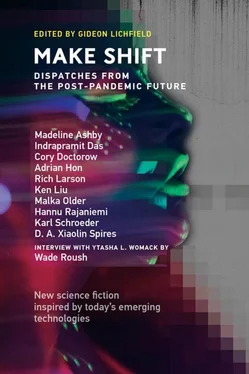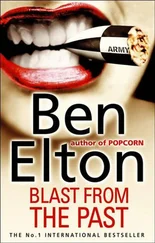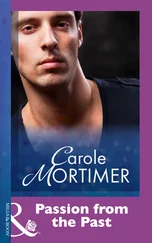“Very?” He was grinning.
Erin looked at the teacups all in a row. “Detail-oriented.”
“Erin,” he said, “you have no idea.”

4
Interviews of Importance
Malka Older
THEN THE NOTIFICATION WENT OFF, A SHORT MINOR-KEY MELODY, AND CHELA FELTthe usual pang of surprise and sorrow, although she was fairly sure she knew who it would be.
She picked up her phone and checked. Yes, the ninety-eight-year-old, the registered nurse and great-grandmother, had died. Not unexpected, but still sad.
Elder Resources talked a good game about recognizing the necessary emotional complexities of the work, and they were allowed to—really allowed to, and not discouraged—wait a few days before opening a new client relationship, but Chela preferred to set one up right away and then take a little time before the first interaction to psych herself up. She pulled up the app and spun the simulated wheel.
Chela thought, as she did every time she fired up the app, about how much they must have spent on user experience. It was just a randomizer; there was no need for a pretty colored wheel that clicked so satisfyingly as it turned. Compensation, she imagined, for the rest of the process being distinctly low tech. Everyone wanted a fancy solution, something new, and so even when the obvious answer was just talk to people they tacked on technological frills and furbelows to get you to do it.
Regardless of the reasoning behind it, there was a sensual pleasure in the design, the spin of the randomizer, the palette, the pacing. And then she had been assigned an elder to refill her portfolio.
A man. Chela wished they would let her filter by gender, but no. Eighty-seven, no major health issues but some recent cardiovascular concerns that would have moved him up the list. He had lived in Boston his entire life. Chela usually loved listening to people who had moved around, but there was a certain interest in the view of a single place over a long stretch of changing times.
Bueno. No point in delaying it. She pinged with an appointment request. A few seconds later he called. Of course.
“Hello? Hello?”
“Hello, this is your Elder Resources interviewer. I was hoping to set up a time to talk.”
“Sure, now’s fine, nothing else to do.”
“I’m afraid I can’t do it right now.” Chela didn’t have another appointment, but she needed to prepare herself. She needed to know when it was going to happen, build up to it, settle herself first with her routine. And she needed to set the tone from the start, control access to herself. She was so grateful that the interactions were anonymized both ways.
“Then why did you call me?”
“To set up an appointment.” Practice had made Chela smoother at this, no longer inclined to argue the fact that she hadn’t, in fact, called, only sent a message. She knew her irritation was unfair. Who knew how she would manage with newer technologies when she was eighty-seven?
The man was still grumbling. “An interview, as if anyone cared what I thought.”
“We care,” Chela said, with a fixed stare to get herself through it. We , a kind of we that might not include her individual I.
No, that wasn’t true. She did care. Or, at least, she found it mildly interesting. “And it’s not just what you think. It’s what you remember. What you’ve seen. What you want to contribute that maybe no one is listening to.”
“You’re only asking me because I might die.” There was an extra querulousness in his voice for that, and his fear opened up a welcome path to sympathy.
“ I might die, and nobody’s interviewing me. Anyone might. That’s not why we’re requesting an interview with you. It’s because your long memories are rare and useful.” She didn’t know yet whether he in fact had long memories. She had interviewed some people who couldn’t tell her much of anything about their childhood or young adulthood, others who’d recalled movies as their own history. And she didn’t know if the memories would be useful. But there was no reliable way to find out without trying.
“Not so rare as all that,” he mumbled, but he agreed to a time two days hence.
Why did some people not want to be interviewed? Yes, there was the whole reminder-of-mortality thing—would have been very fashionable in the Middle Ages or whenever those skull paperweights had been trendy—but it seemed more than that. An ingrained reticence about seeming to demand attention? Some old-fashioned notion of privacy? The recordings were fully anonymized if people asked, but most didn’t.
The interviews were what everyone thought of when they thought about Elder Resources, this new agency in every local government and at the federal level. It wasn’t supposed to be the most important part of their mandate, at least not when the program had been designed, shortly after the pandemic. The goal had been to create a network connecting elders with working-age people, both to reduce loneliness and isolation (supposedly among the elders, although Chela thought that was also what some of her colleagues got out of the job) and to have some early warning and support for vulnerable people in any kind of future disaster. Then there had been the additional consideration of technological competence for the elderly: the new measures for digital democracy required people to feel comfortable conversing, debating, and ultimately voting virtually, and the user interface for the network had mimicked the one used for civic participation.
It had been a grand idea, one of the sweeping policy innovations that had come out after the crisis, ticking off the objectives of valuing the elderly and creating jobs and community preparedness and democracy. And then the misinformation had hit. Suddenly everyone was asking why the government wanted to track old people (as if that weren’t thoroughly answered in the policy paper and legislative documents!). People posted indignant comments about other people letting themselves be controlled by government agendas. The phrase death panels resurfaced. There were suggestions that anyone who let their parents enroll in the program didn’t care enough about them to take care of their elders themselves. Predictably enough, participation plummeted, as did the energy of the employees. Even Chela’s mother had asked her—cautiously, because they were having a lot of fights about politics at that time—whether she was sure she wanted to work for Elder Resources.
Somehow, though, the interview component had escaped most of the opprobrium. Maybe because the interviews were a one- or two-time thing, instead of an ongoing relationship. Maybe people liked talking about themselves more than they liked the idea of someone keeping tabs on them. In any case, at this point, seven years later, Elder Resources was almost exclusively associated in the public’s mind with the interview portion of the program; the networks still existed, but the agency focused its public communications on the interviews and how they “preserved knowledge for the future.”
Chela had been trying to persuade her own mother to do an interview for months, and the vieja always put her off. She wasn’t on the roster yet, since Chela’s mother was (thankfully), at sixty-two, not considered remotely urgent, but anyone could request an interview.
“Mmm, I don’t know, I don’t really see the point,” her mother said, and Chela felt like kicking her.
“It’s only my entire thankless underpaid job that is predicated on there being a point to this, Mami.”
Читать дальше













